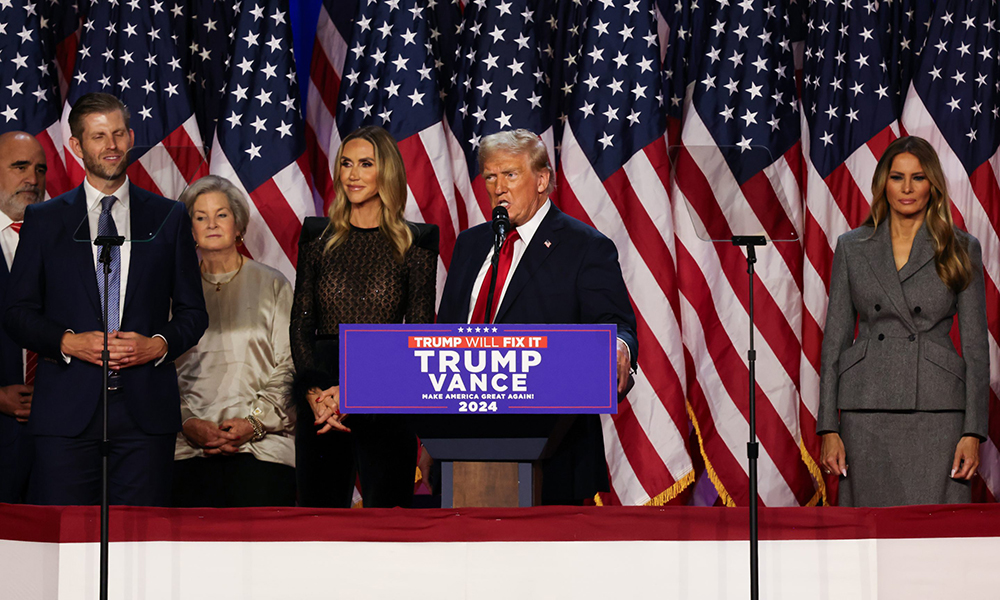
唐納德·特朗普再次當(dāng)選總統(tǒng),。這會帶來諸多影響,,但我們將重點(diǎn)關(guān)注他提出的經(jīng)濟(jì)政策,以及這些政策可能對商業(yè)造成的影響,。
我們從一個(gè)備受爭議的話題開始:關(guān)稅,。
關(guān)稅是一國對從另一國進(jìn)口的商品征收的稅款;關(guān)稅包含在產(chǎn)品價(jià)格當(dāng)中,,所以普通美國人并不經(jīng)常談?wù)撨@個(gè)話題(但對經(jīng)濟(jì)學(xué)家來說,,這卻是另一回事)。你需要知道的是,,正如《財(cái)富》雜志的杰夫·科爾文之前解釋的那樣,,負(fù)責(zé)繳納關(guān)稅的是進(jìn)口公司而不是出口公司。公司通常會將這部分成本盡量轉(zhuǎn)嫁給消費(fèi)者,。
特朗普提出要對所有中國進(jìn)口商品征收60%的關(guān)稅,,并對所有國家的進(jìn)口商品征收10%的全面關(guān)稅,這種做法自二戰(zhàn)以來未曾見過,。六年前,,特朗普稱自己為“關(guān)稅俠”。今年,,在競選活動(dòng)中,,他強(qiáng)調(diào)關(guān)稅可以作為一種懲罰或威脅的手段,以使其他國家遵守規(guī)則并提升美國的地位,。在6月的一次集會上,,特朗普表示:“我們將變得非常強(qiáng)硬,如果一個(gè)國家不守規(guī)矩,,我們將對那個(gè)國家征收高額關(guān)稅,?!?/p>
但關(guān)稅對普通人來說可能并非好事。根據(jù)彼得森國際經(jīng)濟(jì)研究所(Peterson Institute for International Economics)的數(shù)據(jù),,特朗普的關(guān)稅可能使一個(gè)中等收入家庭每年額外支出1,700美元,。如果像他所提到的那樣,10%的全面關(guān)稅實(shí)際上變成20%的全面關(guān)稅,,那么一個(gè)中等收入家庭每年需要多花2,600美元,。
高關(guān)稅不符合經(jīng)濟(jì)學(xué)家們所說的自由貿(mào)易;六年前,,特朗普曾經(jīng)說過:“貿(mào)易戰(zhàn)是好事,,容易取勝?!?/p>
有兩位經(jīng)濟(jì)學(xué)家之前曾告訴我,,他們認(rèn)為在特朗普的政策方案中,關(guān)稅是可能引發(fā)通脹的政策之一,,另一部分是他的潛在稅收政策,。華爾街期待特朗普減稅。特朗普呼吁將某些公司的企業(yè)稅率降低到15%,,他還暗示取消小費(fèi)稅,,甚至還考慮取消聯(lián)邦所得稅。而且,,他希望延長他在2017年第一個(gè)任期內(nèi)通過的一項(xiàng)法律的部分內(nèi)容,,特別是減少所得稅和遺產(chǎn)稅的部分,這些內(nèi)容將于明年年底到期,。
在監(jiān)管方面,,他的政策并不令人意外:就像鹽和胡椒通常會搭配使用一樣,放松監(jiān)管是共和黨人的一貫主張,。企業(yè)通常喜歡這種立場,;加密貨幣領(lǐng)域肯定會支持這樣做。但讓我們花點(diǎn)時(shí)間考慮一下房地產(chǎn)行業(yè),。美聯(lián)儲(Federal Reserve)主席杰羅姆·鮑威爾曾表示,,即使美聯(lián)儲已經(jīng)設(shè)法抑制通脹,它依舊無法解決房地產(chǎn)市場的問題,。住房問題可能是民眾對經(jīng)濟(jì)普遍不滿的根源,,除了大規(guī)模驅(qū)逐移民外,特朗普似乎在這個(gè)問題上搖擺不定,。
四年前,,特朗普和他的住房與城市發(fā)展部部長本·卡爾森在《華爾街日報(bào)》上撰寫了一篇評論文章,標(biāo)題為《我們將保護(hù)美國的郊區(qū)》(We’ll Protect America’s Suburbs),。他們譴責(zé)廢除單戶住宅區(qū)劃和在某些社區(qū)建造公寓,。今年,,在競選活動(dòng)中,在與喬·拜登競爭時(shí),,特朗普表示他將阻止拜登“廢棄郊區(qū)的險(xiǎn)惡計(jì)劃”,。但在接受彭博社采訪時(shí),他稱區(qū)劃為“破壞性因素”,。一位經(jīng)濟(jì)學(xué)家之前告訴我,,你不能一邊譴責(zé)民主黨對城市的嚴(yán)格監(jiān)管,一邊保護(hù)郊區(qū),,并允許它們的排斥性區(qū)劃,。
即使特朗普可以通過行政命令推行某些議題,我們不能忘記國會掌握著財(cái)政大權(quán),。共和黨已經(jīng)贏得了參議院的控制權(quán),但眾議院目前仍在爭奪中,。無論如何,,隨著特朗普勝選,如果說有一件事需要考慮,,那就是許多美國人信任特朗普處理經(jīng)濟(jì)問題的能力——盡管經(jīng)濟(jì)學(xué)家預(yù)計(jì)在他任期內(nèi)物價(jià)會上漲,。即便如此,特朗普勝選正在推動(dòng)市場大幅上漲,。(財(cái)富中文網(wǎng))
譯者:劉進(jìn)龍
審校:汪皓
唐納德·特朗普再次當(dāng)選總統(tǒng),。這會帶來諸多影響,但我們將重點(diǎn)關(guān)注他提出的經(jīng)濟(jì)政策,,以及這些政策可能對商業(yè)造成的影響,。
我們從一個(gè)備受爭議的話題開始:關(guān)稅。
關(guān)稅是一國對從另一國進(jìn)口的商品征收的稅款,;關(guān)稅包含在產(chǎn)品價(jià)格當(dāng)中,,所以普通美國人并不經(jīng)常談?wù)撨@個(gè)話題(但對經(jīng)濟(jì)學(xué)家來說,這卻是另一回事),。你需要知道的是,,正如《財(cái)富》雜志的杰夫·科爾文之前解釋的那樣,負(fù)責(zé)繳納關(guān)稅的是進(jìn)口公司而不是出口公司,。公司通常會將這部分成本盡量轉(zhuǎn)嫁給消費(fèi)者,。
特朗普提出要對所有中國進(jìn)口商品征收60%的關(guān)稅,并對所有國家的進(jìn)口商品征收10%的全面關(guān)稅,,這種做法自二戰(zhàn)以來未曾見過,。六年前,特朗普稱自己為“關(guān)稅俠”,。今年,,在競選活動(dòng)中,,他強(qiáng)調(diào)關(guān)稅可以作為一種懲罰或威脅的手段,以使其他國家遵守規(guī)則并提升美國的地位,。在6月的一次集會上,,特朗普表示:“我們將變得非常強(qiáng)硬,如果一個(gè)國家不守規(guī)矩,,我們將對那個(gè)國家征收高額關(guān)稅,。”
但關(guān)稅對普通人來說可能并非好事,。根據(jù)彼得森國際經(jīng)濟(jì)研究所(Peterson Institute for International Economics)的數(shù)據(jù),,特朗普的關(guān)稅可能使一個(gè)中等收入家庭每年額外支出1,700美元。如果像他所提到的那樣,,10%的全面關(guān)稅實(shí)際上變成20%的全面關(guān)稅,,那么一個(gè)中等收入家庭每年需要多花2,600美元。
高關(guān)稅不符合經(jīng)濟(jì)學(xué)家們所說的自由貿(mào)易,;六年前,,特朗普曾經(jīng)說過:“貿(mào)易戰(zhàn)是好事,容易取勝,?!?/p>
有兩位經(jīng)濟(jì)學(xué)家之前曾告訴我,他們認(rèn)為在特朗普的政策方案中,,關(guān)稅是可能引發(fā)通脹的政策之一,,另一部分是他的潛在稅收政策。華爾街期待特朗普減稅,。特朗普呼吁將某些公司的企業(yè)稅率降低到15%,,他還暗示取消小費(fèi)稅,甚至還考慮取消聯(lián)邦所得稅,。而且,,他希望延長他在2017年第一個(gè)任期內(nèi)通過的一項(xiàng)法律的部分內(nèi)容,特別是減少所得稅和遺產(chǎn)稅的部分,,這些內(nèi)容將于明年年底到期,。
在監(jiān)管方面,他的政策并不令人意外:就像鹽和胡椒通常會搭配使用一樣,,放松監(jiān)管是共和黨人的一貫主張,。企業(yè)通常喜歡這種立場;加密貨幣領(lǐng)域肯定會支持這樣做,。但讓我們花點(diǎn)時(shí)間考慮一下房地產(chǎn)行業(yè),。美聯(lián)儲(Federal Reserve)主席杰羅姆·鮑威爾曾表示,即使美聯(lián)儲已經(jīng)設(shè)法抑制通脹,它依舊無法解決房地產(chǎn)市場的問題,。住房問題可能是民眾對經(jīng)濟(jì)普遍不滿的根源,,除了大規(guī)模驅(qū)逐移民外,特朗普似乎在這個(gè)問題上搖擺不定,。
四年前,,特朗普和他的住房與城市發(fā)展部部長本·卡爾森在《華爾街日報(bào)》上撰寫了一篇評論文章,標(biāo)題為《我們將保護(hù)美國的郊區(qū)》(We’ll Protect America’s Suburbs),。他們譴責(zé)廢除單戶住宅區(qū)劃和在某些社區(qū)建造公寓,。今年,在競選活動(dòng)中,,在與喬·拜登競爭時(shí),,特朗普表示他將阻止拜登“廢棄郊區(qū)的險(xiǎn)惡計(jì)劃”。但在接受彭博社采訪時(shí),,他稱區(qū)劃為“破壞性因素”,。一位經(jīng)濟(jì)學(xué)家之前告訴我,你不能一邊譴責(zé)民主黨對城市的嚴(yán)格監(jiān)管,,一邊保護(hù)郊區(qū),,并允許它們的排斥性區(qū)劃。
即使特朗普可以通過行政命令推行某些議題,,我們不能忘記國會掌握著財(cái)政大權(quán)。共和黨已經(jīng)贏得了參議院的控制權(quán),,但眾議院目前仍在爭奪中,。無論如何,隨著特朗普勝選,,如果說有一件事需要考慮,,那就是許多美國人信任特朗普處理經(jīng)濟(jì)問題的能力——盡管經(jīng)濟(jì)學(xué)家預(yù)計(jì)在他任期內(nèi)物價(jià)會上漲。即便如此,,特朗普勝選正在推動(dòng)市場大幅上漲,。(財(cái)富中文網(wǎng))
譯者:劉進(jìn)龍
審校:汪皓
Donald Trump is president, again. There is a lot that comes with that, but we’ll focus on his proposed economic policies, and what it all might mean for business.
Let’s start with a hotly debated topic: tariffs.
Tariffs are taxes imposed by one country on goods imported from another country; they’re baked into prices of products, so they aren’t always talked about among typical Americans (among economists, well, that’s a different story). What you need to know is the importing company pays the tariff, not the exporting one, as Fortune’s Geoff Colvin previously explained. Companies often pass on as much of that cost as they can to consumers.
Trump has proposed a 60% tariff on all Chinese imports and a universal 10% tariff on imports from all countries, a practice unseen since World War II. Six years ago, Trump called himself “a Tariff Man.” This year, on the campaign trail, he stressed tariffs can be used as a penalty or threat of sorts to keep other countries in line and elevate America. At a rally in June, he said: “We are going to be so tough, and if a country is not going to behave, we’re going to tariff the hell out of that country.”
But tariffs might not actually be great for everyday people. His tariffs could cost a middle-income household $1,700 a year, according to the Peterson Institute for International Economics. If that 10% universal tariff were to actually be a 20% universal tariff, which he has floated, it would cost that same middle-income household $2,600 a year.
Higher tariffs do not go hand in hand in with what economists call free trade; and again, six years ago, Trump said, “trade wars are good, and easy to win.”
Two economists previously told me tariffs were one part of Trump’s policy proposals they considered inflationary, another was his potential tax policies. Wall Street is anticipating lower taxes, for one. Trump has called for lowering the corporate tax rate to 15% for certain companies, he’s teased an end to taxing tips, and he’s even flirted with eliminating federal income taxes. Not to mention, he wants to extend parts of a 2017 law passed in his first term, particularly income and estate tax cuts, that are set to expire at the end of next year.
And in terms of regulation, his policies aren’t very surprising: Republicans and deregulation often gang together like salt and pepper. Businesses typically love that; crypto definitely does. But let’s take a moment to consider the world of housing, something Federal Reserve Chair Jerome Powell has said the central bank can’t fix, even if it has managed to tamp inflation down. Housing could be at the root of this widespread dissatisfaction with the economy, and apart from mass deportation, Trump seems to waffle on the issue.
Four years ago, Trump and Ben Carson, his secretary of Housing and Urban Development, wrote a commentary in the Wall Street Journal titled: “We’ll Protect America’s Suburbs.” They condemned abolishing single-family zoning and building apartments in certain neighborhoods. This year, on the campaign trail, when he was still running against Joe Biden, Trump said he’d stop Biden’s “sinister plan to abolish the suburbs.” But in an interview with Bloomberg, he called zoning “a killer.” You can’t punish blue cities for strict regulations while protecting suburbs and allowing their exclusionary practices, an economist previously told me.
Congress holds the power of the purse though, we can’t forget that, even if there are things Trump can implement via executive order. Republicans have won control of the Senate, but the House is still up for grabs, at the moment. Either way, if there is one thing to consider with this Trump win, it’s that a lot of Americans trust him with the economy—that is despite the fact that economists expect prices to rise under him. Even so, markets are surging on his win.






